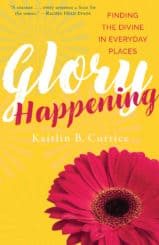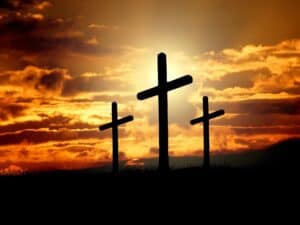
The Early Church
You think because you understand “one” you must understand “two,” because one and one make two. But you must also understand “and.”
—Sufi saying
In our early married churchgoing days, we attended a little nondenominational congregation, grace-based in belief and charismatic in worship. For community group, we spent the evenings in Justin and Kari’s home with their four kids.
I’d sit in the kitchen and watch Kari do what she does—scrub the sink clean, speak to me about what it means to walk in the Spirit while making dinner for all of us and cleaning out the coffee grinder. She taught me how to eat dark chocolate and sprout raw almonds, how to drink wine and laugh.
We could hear Justin playing guitar in the living room, and worship permeated our air, blending with the smell of that ground coffee.
I learned a new language of community with these people. I learned family and meal-sharing—how to speak about being a parent without actually being one.
I just watched them most of the time, and it was a blessing to be brought into their kind reality. I didn’t take it lightly. Kari showed me what the all-encompassing role of mother and wife and church leader and friend and psychologist and rock climber looks like.
It’s been years since we’ve been with that community, in that particular home, but I can picture it still. I can see the blue and gray hues in the front room and see Uriah and Avery playing chess with Travis at the kitchen table. I can smell the brewed cup of coffee that Justin just poured and hear Rhoen screaming as he runs through the house, laughing. Cana is hanging off her dad’s arms, gymnast that she’s always been.
And I see our little church, hands lifted in worship, bodies swaying to the rhythm of music and Spirit. I remember the way we prayed together, the way we sought God together, the way we screwed up together and tried our best to take grace anyway.
I remember the way we prayed together, the way we sought God together, the way we screwed up together and tried our best to take grace anyway.
On Sunday mornings long before church started, I worked in the kitchen with Lissa and Bailey, the breakfast crew that would bake cinnamon rolls and rearrange messy drawers and brew the coffee for everyone to drink throughout the service.
That community was where Travis and I learned to lead small groups, with our whole selves thrown in, just like our friends Justin and Kari before us. They live in a new place now, and I try to picture their family space, the adventures they go on every day, the way they face life and work and worship as a family.
And when I scrub my kitchen sink, every single time, I think of Kari and that church, that community that birthed us into our marriage and carried us for a few short years before we moved on to a new season in a new town.
That early church and those early people poured life into us, helped us shape the soil we would let ourselves grow out of, letting our roots reach down past the mud to get to the water-source.
One season, years and years ago, long before us, the earliest church shaped another group of people, people who learned to care for each other and share their possessions and speak of soul-things. Maybe they ate almonds and dark chocolate and drank coffee, too.
Maybe they cultivated their soil the same way we did, tending to the roots that would one day be fruitful and grow a world that longs to know and belong to God.
Hallelujah for that early church and the many generations of community that have come after her.
Holy Spirit,
I wonder how it felt for you to blow through
that place all those years ago,
like a caged bird suddenly sweeping its wings
freely across the world outside.
You were already around,
already present,
but something new happened there
and something steady and good
took place from that day on.
You became a kind of tangible thing
that they’d always longed for
and were probably afraid to know.
But there you were,
and today you’re still sweeping by,
still invading and speaking
and bringing so much
good that we could
never understand it all
with our human hearts.
Still, sweep by us
and into us
and make us
wholly yours.
Amen.
The Great Cloud
When we come to know our inner God, which is our true self, we will know that the divine is in everybody.
—Howard Murphet
Who, exactly, is in the great cloud of witnesses described again and again in the Christ-seeking tradition?
One afternoon I put the boys down for their naps and exchanged a few emotional text messages with a friend. She was about to release her first book, all nerves and excitement. And I am on the journey of writing, the journey of discovering and asking and seeking for the sake of a fuller human experience.
So, from my little apartment living room, thinking of my friend sitting in her living room, I pictured her there, resting at the edge of a vast ocean.
Instead of walls, there were waves.
Instead of household sounds, there was only the full crash of water crest upon water crest—with the sight of leaping fish and reflected sunlight against blue salt.
We’re both overcome by the goodness of God. We’re both seen, known, held, just like Moses and Saul-turned-Paul, just like Mary Magdalene and Hagar. The great cloud of witnesses is you, and it is me.
The great cloud of witnesses is you, and it is me.
It is the way we surround each other, the way we share seasons and dreams. It is in the quiet of our living room as we stare into those depths, as we sense the kind hands that sweep over all of it.
It is the woman at the grocery store who flirts with my boys and says, “I remember those days. Cherish them.” It is the pedestrian crossing the street at the corner of Church and Ponce. It is my barista, Katherine. It is Blaze, Rozie, Mishma, Chavez, Shaq, and Chance, the servers who have become family at a local burger restaurant we eat at every Sunday. The great cloud is made up of the ones gathered around us, people whose pulse marks the breath of God, whose very being shows evidence of what is sacred.
It is the gay man to my right and the straight man to my left, the conservative and the progressive, both pumping the same gasoline.
We make up the witnesses, the people who can criticize the church and still love her deeply, because we claim the Resurrection. We claim these days of glory, these moments of reconciliation and presence, of grace and Kingdom.
We ask God if the Kingdom is even there, all the while trusting it to be closer than ever.
We are the great cloud.
We are the ones who see God,
the ones who are seen by Mystery.
Hallelujah for that kind of glory.
O God,
If we make it to our old and gray days,
show us who we were all those years before.
When we are welcomed into your eternal fold,
let us look back with you—
into all the dark places, into all the light.
So that we see what you see,
know what you know
and understand
that you held us all those years,
in all those seasons,
right there in the midst
of our everyday breathing.
Hallelujah
and Amen.
A Church for the Children
Occasionally it is not the open air or the church that we desire, but both.
—J. Philip Newell
For our first two years in Georgia, every time we drove Travis to campus, we’d pass an abandoned church a few miles from our apartment complex, and Eliot would ask why it was abandoned and what would happen to the empty building. Those questions came after he commented on how beautiful it was.
After being away for two weeks last summer, we came home to find demolition of that church building had begun. The next weekend, the bell tower had finally fallen, all was dirt and twisted metal, the bell nowhere to be seen.
“Mommy, will our church be ripped down one day like that one?” Eliot asked.
Our children ask the really difficult questions, the ones we’re afraid to whisper to the outside air; they are brave.
And I replied, “Oh, sweetie, I hope not, but we don’t really know.”
Today, the children are asking what the church is, how she is strong and good, and what she will look like in the years ahead. Even after being in Georgia for barely a year, Eliot and Isaiah had already noticed the denominational divides. They know the Methodists’ bell tower from the Baptists’ columns, the Presbyterians’ steeple from the Episcopalians’ color-tinted windows.
Eliot sees church as building—stone, brick, paint, rooms—and we must remind him that church is Kingdom, too—people, nature, life abounding.
Eliot sees church as building—stone, brick, paint, rooms—and we must remind him that church is Kingdom, too—people, nature, life abounding. Church is Thursday afternoons with Leanna. Church is sheep-watching with Joss and Debra. Church is eating the homegrown veggies Hannah gifted to us. Church is an evening at the climbing gym with Daniel and Connor and the boys’ favorite staff member, Shawn.
Church is the farmers market on the lawn. Church is the international market where we buy our groceries. Church is Taproom coffee where I read Richard Rohr and drink my latte.
Church is the holy and good encouragement of a weekly gathering with people we dearly love and fight for. Church is us—you, me, our aunts and uncles and children and neighbors, and sometimes our enemies, too.
The Kingdom is not bound by brick walls, not hemmed in by any denomination’s guidelines. It doesn’t exist only when the bells are tolling the church hour.
So when our children see churches fall, we remind them of the good gifts given, of the body and the blood, of the faces and names and stories that make up the heart of God here on earth.
And maybe then we ourselves will learn from our little ones’ glorious light to become brave. They teach us to stand taller with one another, to kneel lower to be with God, and to boldly ask for more Kingdom, even in our darkest hours.
A friend asked me what I’d like the church to look like for my boys ten years from now.
“I want them to ask the same childlike questions that they are asking now—and I want the church not to be afraid to ask them those same questions,” I said after a long pause.
Our children see the things we do not see, understand Jesus in ways we have long forgotten. They hold the capacity to redefine the church, to reawaken hearts. If we teach our children that church is Kingdom and Kingdom is church in our everyday breathing, in everyday glory, then she will never die—horizons will be forever open on every side.
Oh, Jesus, may we think outside again.
May we look to the rest of the world,
to the “other,”
to the broken,
not to fix them,
but to receive from them,
to share in life with them.
Jesus, you gave everything you were to all of us,
but you also let us become a part of you.
So help us learn to be a part of each other.
We’re in so much need.
Amen.
 Kaitlin B. Curtice is a Native American Christian author, speaker and worship leader. As an enrolled member of the Potawatomi Citizen Band and someone who has grown up in the Christian faith, Kaitlin writes on the intersection of Native American spirituality, mystic faith in everyday life, and the church. She is a contributor to Sojourners, and you can also find her work on Patheos Progressive Christian. This excerpt is taken from Glory Happening: Finding the Divine in Everyday Places, copyright © 2017 by Kaitlin B. Curtice. Used by permission of Paraclete Press.
Kaitlin B. Curtice is a Native American Christian author, speaker and worship leader. As an enrolled member of the Potawatomi Citizen Band and someone who has grown up in the Christian faith, Kaitlin writes on the intersection of Native American spirituality, mystic faith in everyday life, and the church. She is a contributor to Sojourners, and you can also find her work on Patheos Progressive Christian. This excerpt is taken from Glory Happening: Finding the Divine in Everyday Places, copyright © 2017 by Kaitlin B. Curtice. Used by permission of Paraclete Press.


